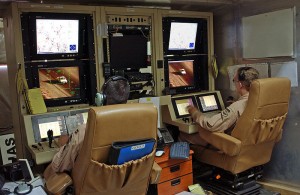What’s it like to kill human beings by dropping bombs with the push of buttons on your computer keyboard 7,000 miles away? Imaging doing this every work day, then driving home to hug your wife and kids every night. This video from FrontLine will give you a good idea of what it’s like. Whatever your emotional reaction to this form of “warfare,” you will find someone agreeing with you (and disagreeing with you) in the comments following the video.

If our enemies were using robotic planes to drop bombs on American soil, I suspect that we’d be outraged, much more than by conventional warfare. This is certainly a sterile way of war, no matter how much the supervisors remind the pilots that they are killing human beings.
If I understood why we are at “war” in Afghanistan and Iraq, maybe then I could understand whether these drones are furthering our “war objectives.”


Possibly inappropriate due to making fun.
http://xkcd.com/652/
The more I read about these drone operations, the more disturbed I am by the philosophy behind them. Quoting Marc W. Herold, Department of Economics, University of New Hampshire (warning, graphic images of Afghanistani casualties; emphasis included in original):
And now from John Pilger, one of the UK's top reporters:
This sanitization of the war is the only thing that allows it to continue, as I know you've argued before. I agree, but we should also oppose it on the basis that it's strengthening the "insurgency" (resistance) rather than weakening it. "Death from the skies" is no way to win hearts and minds.
Brynn: I agree entirely with you. We are not winning hearts and minds by dropping bombs from the sky. Equally important, It's not clear what it means to "win" this war. Does it mean to establish a country with rigged elections like ours? Will they be fully "free" once their political campaigns involve massive influx of money from businesses to politicians who will then be beholden to those businesses? And where the mainstream media declares TWO YEARS before the election who is a "serious" candidate based on his or her money-raising potential? If so, Afghanistan's political corruption is already on par with our own.
Yes, some people in Afghanistan have customs that repulse many of us, such as their refusal to allow women to participate in many aspects of politics and society. I agree that these are terribly serious issues, but we need to ask ourselves over and over whether dropping bombs from the sky will solve those kinds of problems, or whether bombing (and patrolling the streets with hand-held weapons) simply makes more and more Afghan people hate us.
Also, note the doublethink of the soldier they interview- "We are saving people's lives by employing weapons."
What I think he's saying is we are saving American lives (which are worth more). This fits in neatly with Marc Herod's point above- that it's the result of a conscious decision to put civilians in harms way in order to protect the lives of US military.
Brynn: Marc Herold's article is excellent and disturbing. Thank you for posting the link. As Herold notes, the Afghanistan "war" is a classic case of "sunk costs." http://dangerousintersection.org/2006/03/21/sunk-… I am embarrassed for our country that U.S. public employees would write the sorts of things that they write on long-range bombs.
I also was disturbed (though not surprised) to see the section comparing the two versions of the Oct 15, 2001 bombing mission. There is the "successful mission" American version, of course. Then there are the sobering reports from alternative news sources:
http://www.rawa.org/temp/runews/2009/10/15/killin…
There is so much thoughtful information in the Herold article. The following quote brought to mind George Lakoff's many writings about the importance of framing (e.g., see here: http://dangerousintersection.org/2006/07/10/wides… ) The following was written by Herold:
Jane Mayer (journalist with The New Yorker) was interviewed on NPR this week about the covert CIA drone program.
Oh, and also this article today from Jacob Hornberger:
David Sirota at Salon writes the following regarding what we in American callously refer to as the "drone war":
http://www.salon.com/news/opinion/feature/2010/05…
Philip Alston, a New York University law professor who also serves as the U.N.'s special rapporteur on extrajudicial killings, urged Washington to scale back its drone campaign in places outside of traditional war zones and urged the establishment of new international guidelines on the use of targeted killings. Forty countries currently have drones, though few field an armed variant. Acknowledging the way in which technology has changed war, the report also warns that because drone pilots are based thousands of miles from the battlefield, they could develop a "PlayStation mentality to killing."
http://www.usnews.com/news/articles/2010/06/10/ci…